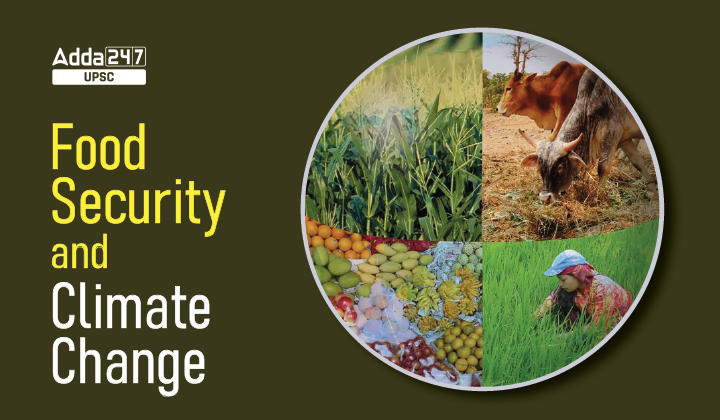Table of Contents
Food Security and Climate Change: Relevance for UPSC Exam
General Studies III- Agriculture and related issues,PDS, Buffer Stock & Food Security
Food Security and Climate Change: Context
The Union Cabinet has approved the extension for the Pradhan Mantri Garib Kalyan Anna Yojana (PMGKAY-Phase VII) for a further period of 3 months from October to December 2022.
What is Climate Change?
- United Nations defines Climate change as long-term shifts in temperatures and weather patterns. These shifts may be natural, such as through variations in the solar cycle. But since the 1800s, human activities have been the main driver of climate change, primarily due to burning fossil fuels like coal, oil and gas
What is food security?
- The Food and Agriculture Organization (FAO)defines food security as , when all people, at all times, have physical and economic access to sufficient, safe and nutritious food to meet their dietary needs and food preferences for an active and healthy life.
Pradhan Mantri Garib Kalyan Anna Yojana
- Pradhan Mantri Garib Kalyan Anna Yojana (PM-GKAY) is a scheme as part of Atmanirbhar Bharat to supply free food grains to migrants and poor.
- Phase-I and Phase-II of this scheme was operational from April to June, 2020 and July to November, 2020 respectively.
- The PMGKAY scheme for Phase VI from April-September, 2022 would entail an estimated additional food subsidy of Rs. Rs. 80,000 Crore.
Food Security and Climate Change: Interlink
- India is going to have extreme events such as heatwaves, droughts, floods, etc. of increasing intensity and frequency.
- We may keep blaming developed economies and ask for climate justice, yet we will have to act fast and boldly to correct our own policies that increase GHG emissions and aggravate the situation.
- Power provided at next-to-nothing prices, free water and highly subsidized fertilizers especially urea are some of the policies that are damaging the natural environment.
- Food ecosystem: Food security is one of the leading concerns associated with climate change. Climate change affects food security in complex ways. It impacts crops, livestock, forestry, fisheries and aquaculture, and can cause grave social and economic consequences in the form of reduced incomes, eroded livelihoods, trade disruption and adverse health impacts.
Food security: A matter of concern
- The fiscal deficit of the Centre may go higher than provisioned in the Budget for FY23. The finance ministry not supporting the extension of this free food beyond September was, economically, a rational recommendation. More so as Covid-19 is behind us and the economy is back to its normal level of activity.
- The PMGKAY was announced in April 2020 in the wake of the pandemic’s first wave. At that time, it was perhaps necessary to support all those who lost their jobs. But doubling free rations depleted the bulging stocks of grains. Now with wheat procurement having plummeted, there is a concern about whether stocks are enough to curb inflationary expectations in the country.
- To replenish wheat stocks in FCI godowns, the government will have to raise the minimum support price (MSP) of wheat quite substantially. For rice, the current stocks are ample, but given the monsoon vagaries, the forthcoming rice harvest is estimated to be about 7 million tonnes less.
- PMGKAY will be difficult to extend beyond December without putting an undue burden on MSPs and the fiscal deficit.
Other reasons:
- Even though the RBI has raised the repo rate by 50 basis points, the probability of inflation, as measured by the consumer price index (CPI), remaining higher than the central bank’s tolerance band is increasing by the day.
- The RBI has already spent more than $80 billion to support the rupee, and there are limits to which it can go. And, if RBI tries to hold the rupee artificially high, it will adversely hit Indian exports, widening the current account deficit and putting further pressure on the rupee. The best that RBI can and should do is to avoid a sudden and abrupt fall in the rupee, but also let it find its natural level given what is happening globally, especially in the currency markets.
- Long haul: The risks of higher inflation from the falling rupee remain and are likely to continue for at least one year, if not more.
What can be done?
- Government must focus on innovative policies to promote exports and attract more foreign direct investment (FDI).
- Fix the issue prices of PDS supplies at half the MSP and limit the PDS coverage to 30 per cent of the bottom population.
- The best that RBI can and should do is to avoid a sudden and abrupt fall in the rupee, but also let it find its natural level given what is happening globally, especially in the currency markets.
- If we have to tame food inflation, we will have to invest more in climate-smart agriculture, in precision farming, with high productivity and less damage to natural resources.
- Science and technologies can, of course, help us, but they cannot be scaled in a perverse policy ecosystem.
- India needs to step up public investment in development and dissemination of crop varieties which are more tolerant of temperature and precipitation fluctuations and are more water and nutrient efficient.
- A four-pronged strategy is recommended for the water sector; Increase irrigation efficiency, Promote micro irrigation in water-deficient areas, Better water resource infrastructure planning, Restoration of water bodies in rural areas, Stronger emphasis on public health.
- A recent report by NITI Aayog suggests that the government should transfer a minimum specified sum of cash to affected farmers and landless workers as an instant relief. For richer farmers who may want insurance above this relief, the report recommends a separate commercially viable crop insurance programme.
Conclusion
- So far India has done well to tame the food inflation as compared to other developed and developing economies. Present policy of RBI burning the FOREX and government increasing the deficit is unsustainable in long run. Food security needs to be insured by climate resilient policies for long term sustenance.




 TSPSC Group 1 Question Paper 2024, Downl...
TSPSC Group 1 Question Paper 2024, Downl...
 TSPSC Group 1 Answer key 2024 Out, Downl...
TSPSC Group 1 Answer key 2024 Out, Downl...
 UPSC Prelims 2024 Question Paper, Downlo...
UPSC Prelims 2024 Question Paper, Downlo...
